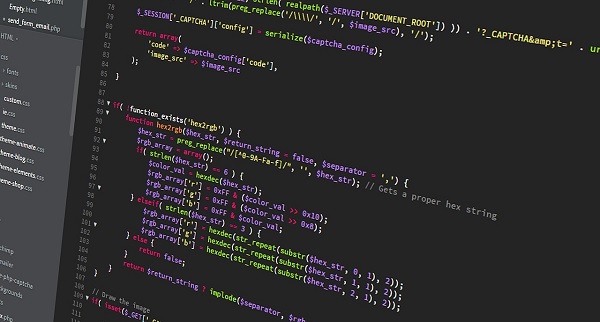Although a master’s in computer science is among the highest-paying master’s degrees, some prospective students may wonder if a formal education in this field is really necessary. If you have already developed some proficiency in coding through independent study or through classes in your kindergarten through twelfth-grade education, you’re already off on the right foot. Ultimately, whether you need a formal degree to work in computer science depends on your goals, so this decision will be different for individual students.
What You Can Do as a Self-Taught Coder
IMAGE SOURCE: Pixabay, public domain
At the end of the day, your practical skills are probably the most important factor in whether or not you will succeed in a programming job capacity. You need strong coding skills to work in many computer science roles, although coding isn’t always a major component of all jobs in this field. If your coding skills exceed those of job applicants who do have a computer science degree, you may receive more job offers than a less skilled candidate who does have a formal education, but you may need to market yourself more persuasively. Self-taught coders who don’t have a computer science or related degree sometimes go on to work in roles like web developer and entry-level computer programmer, according to job search website Monster.com.
Self-taught coders can go into business for themselves or work for a company where management places the most value on skills and results, not formal qualifications. You might find a startup willing to take a chance on you because your personality fits the company culture or be able to network your way into a low-level job and move up from there.
Some self-taught coders start out their careers with a company in a different role and use the coding skills they gain through informal study to transition into a computer science-related role. Others build their brand through blogs, mobile software applications, video tutorial series, educational courses and other assets and resources, and then receive job offers because of the reputation they have cultivated. There’s no right or wrong way to go about getting your first coding job without a computer science degree, and each career path is slightly different.
When your computer science skills are self-taught, you must have a realistic understanding of your skills and specify in job applications which languages you know. Most self-taught coders start by learning HTML and CSS and then languages like Python and Java.
The Benefits of Having a Degree
If you can get jobs in programming without a degree, why should you put in the time, work and expense of earning one? Having a formal education is certain to expand your career opportunities. It’s worth noting that many of the top programming careers frequently require a minimum of a bachelor’s degree.
Employers don’t choose candidates based solely on their skills, and not having a degree can hurt your employment prospects with some employers. Some employers may insist on candidates having a degree, even if applicants who are lacking the degree claim to have the required skills for the job. They may have a perception that self-taught coding skills may not be equivalent to years of formal programming coursework. Alternatively, employers may prefer candidates with a college education in the field because earning a degree speaks to the applicant’s commitment to learning and professional growth. Finally, a company may prefer to invest in candidates who can keep advancing within the company. A formal degree may be a required part of corporate policy for promotion to management roles in the company.
It isn’t just employer perception that makes a computer science degree valuable. The curriculum of a computer science degree program encompasses more than just coding. You learn more expansive programming skills beyond simple coding and gain a deeper knowledge of the theoretical concepts and foundations of computer science. For example, you might take core classes in cloud computing, data mining, operating systems, artificial intelligence, human-computer interaction, database management, algorithm design and computational modeling. You could pursue a career in a broader array of computer science roles, functions and specializations with a degree than you would be qualified to do if you had only self-taught coding skills to offer.
Your options aren’t limited to completely self-taught vs. bachelor’s and master’s degrees in computer science. There are plenty of middle-ground options, such as acquiring formal certification in a programming language or completing a certificate program at a college.
Additional Resources

